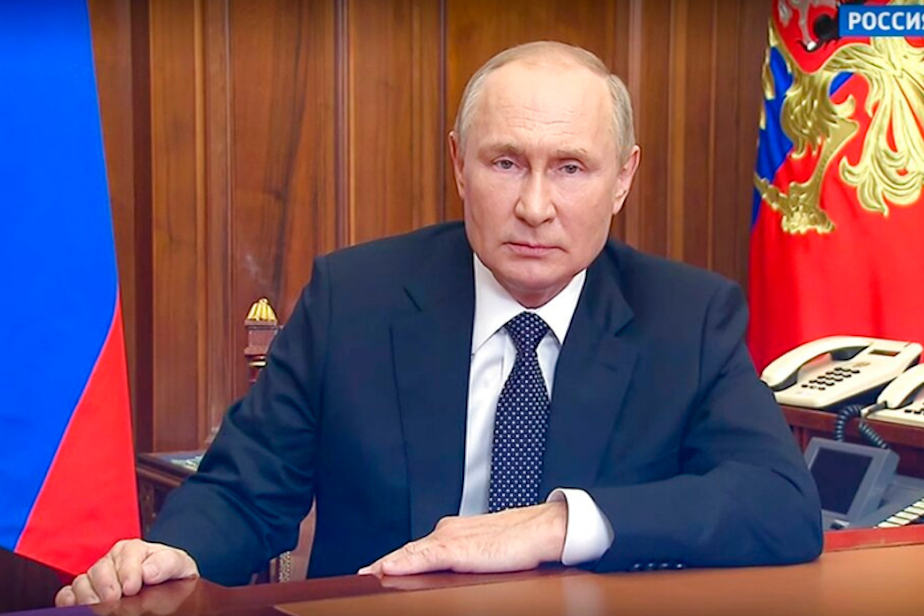It's Taylor Swift week — so vote! Today So Far

- The King County Council has declared a Taylor Swift week. Why? Partially because younger folks need to vote.
- There may be a generational divide emerging in Seattle, along with a gap between longtime residents and newcomers. This could play a role in local elections.
This post originally appeared in KUOW's Today So Far newsletter for July 19, 2023.
Quick hits
- Stabbing suspect in critical condition after being shot by Seattle Police
- Washington state enacts new rules to protect outdoor workers from extreme heat
- Seattle moves one step closer to protecting gig workers from abrupt termination
It's official. We are now in the midst of Taylor Swift week throughout King County. The county council has made it so.
On Tuesday, in a proclamation so filled with puns it makes me proud, the King County Council deemed the week of July 18-25 as Taylor Swift week, coinciding with the pop star's stop in Seattle on her Eras tour. There's a few interesting aspects of this story, like how cities where Swift performs experience a considerable surge in economic activity, even temporary inflation.
But a focus of King County's proclamation is Swift's influence on young fans, particularly when it comes to voting. Councilmember Claudia Balducci noted that Swift has often encouraged fans to become more engaged with elections and register to vote. Some have speculated that her calls to do so have resulted in slight bumps in voter registrations.
"Taylor's unique position and ability to encourage young people to register to vote is something to be honored and replicated," Balducci said.
Officials commonly attempt to get greater numbers of younger voters to take part in elections. Whether it's intentional or not, Swift seems to be influential in this unique nexus. Read more about that here.
It just so happens that Swift arrives in Seattle in the lead up to the Aug. 1 primary election. Ballots are en route to mailboxes throughout Washington state. In Seattle, there could be a generational gap emerging between Seattle voters, which can also break down to newer residents versus longtime residents.
This is notable as Seattle has (as always) a few hot-button issues, and seven out of nine council seats up for grabs.
Take the experience of Theo Martin who runs Island Soul, a Caribbean-inspired restaurant in Columbia City. Martin tells KUOW that he recently asked a man to move along because he was asking his customers for money. That prompted a younger customer to start yelling at Martin, accusing him of being insensitive to people experiencing homelessness and telling him he was a bad neighbor. Martin feels the city needs to increase public safety, not tolerate public drug use, and clean up encampments. But down the street at the Columbia City Farmers Market, Brand Mace has a very different perspective. Mace is in her 20s and moved into Seattle a few months ago. She says people shouldn't be arrested for public drug use and that the police will "cause more harm.” Instead, she wants police funding to be “redistributed to the communities, because we can keep each other safe.”
There's some nuance to this, and how it translates over to the current council election. KUOW's David Hyde has the full story on that here.
DID YOU KNOW?

DID YOU KNOW?
With all the recent attention paid to the activity around a threatened Western redcedar in Seattle's Wedgwood neighborhood, KUOW's Paige Browning brought up an interesting fact in our newsroom: The Western redcedar is not a cedar tree.
According to some smartypants in Oregon, this tree "is actually an arborvitae — a 'false' cedar." It's actually a native conifer tree that is commonly found from northern California up to Alaska. Apparently, genuine cedars only grow in Mediterranean regions. The redcedar can grow up to 200 feet. Historically, it's been pretty significant to Northwest Indigenous tribes, which used its parts for everything from clothing to shelter, weapons, teas, and more. It's no wonder that this very useful tree was sometimes called the "tree of life."
ALSO ON OUR MINDS

Russian President Vladimir Putin will not be attending an economic summit in Johannesburg next month, South Africa's government said Wednesday. That lets the summit's host country breathe a sigh of relief from a critical legal dilemma of whether to act on an international arrest warrant issued for the Russian leader.

